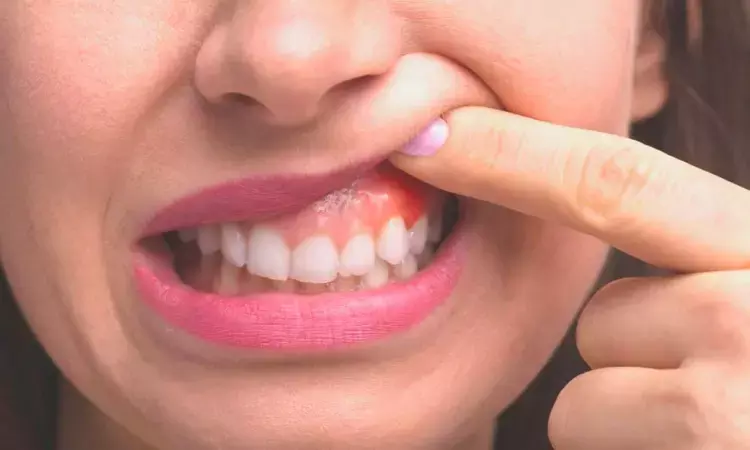- Home
- Medical news & Guidelines
- Anesthesiology
- Cardiology and CTVS
- Critical Care
- Dentistry
- Dermatology
- Diabetes and Endocrinology
- ENT
- Gastroenterology
- Medicine
- Nephrology
- Neurology
- Obstretics-Gynaecology
- Oncology
- Ophthalmology
- Orthopaedics
- Pediatrics-Neonatology
- Psychiatry
- Pulmonology
- Radiology
- Surgery
- Urology
- Laboratory Medicine
- Diet
- Nursing
- Paramedical
- Physiotherapy
- Health news
- Fact Check
- Bone Health Fact Check
- Brain Health Fact Check
- Cancer Related Fact Check
- Child Care Fact Check
- Dental and oral health fact check
- Diabetes and metabolic health fact check
- Diet and Nutrition Fact Check
- Eye and ENT Care Fact Check
- Fitness fact check
- Gut health fact check
- Heart health fact check
- Kidney health fact check
- Medical education fact check
- Men's health fact check
- Respiratory fact check
- Skin and hair care fact check
- Vaccine and Immunization fact check
- Women's health fact check
- AYUSH
- State News
- Andaman and Nicobar Islands
- Andhra Pradesh
- Arunachal Pradesh
- Assam
- Bihar
- Chandigarh
- Chattisgarh
- Dadra and Nagar Haveli
- Daman and Diu
- Delhi
- Goa
- Gujarat
- Haryana
- Himachal Pradesh
- Jammu & Kashmir
- Jharkhand
- Karnataka
- Kerala
- Ladakh
- Lakshadweep
- Madhya Pradesh
- Maharashtra
- Manipur
- Meghalaya
- Mizoram
- Nagaland
- Odisha
- Puducherry
- Punjab
- Rajasthan
- Sikkim
- Tamil Nadu
- Telangana
- Tripura
- Uttar Pradesh
- Uttrakhand
- West Bengal
- Medical Education
- Industry
Full-mouth scaling triggers strong acute-phase response at 24 hours after treatment in diabetes patients

ITALY: One-stage full-mouth scaling (FM-SRP) triggers a robust acute-phase response at 24 hours following treatment compared to conventional quadrant-wise (Q-SRP) scaling in patients with type 2 diabetes (T2D), a recent study published in the Journal of Clinical Periodontology has shown.
"Such acute systemic acute perturbations may counteract the benefit systemic effects of periodontal treatment with regards to HbA1c reduction and improvement in endothelial function in patients with type 2 diabetes," Filippo Graziani from the University of Pisa in Pisa, Italy, and colleagues wrote in their study.
Dr Graziani and colleagues conducted the study to compare the endothelial function and level of inflammatory markers at 24 hours (Day 1) and 90 days (Day 90) following conventional quadrant-wise compared to one-stage full-mouth scaling in patients with T2D.
The study included patients affected by type 2 diabetes and periodontitis. They were randomly allocated to receive FM-SRP or Q-SRP and followed up on Day 1 and Day 90. The following parameters were collected at baseline, Day 1 and Day 90 -- vital signs, serum samples, and flow-mediated dilation (FMD). The collection of periodontal variables was done at baseline and Day 90. The concentration of C-reactive Protein (CRP) was determined on Day 1 after periodontal treatment (primary outcome). Between-group comparisons and intragroup comparisons were made. A total of 40 subjects were included.
The study led to the following findings:
- FM-SRP produced a remarkable increase in CRP and a significant reduction in FMD on Day 1 compared to Q-SRP.
- The absolute HbA1c (mmol/mol) change from baseline to Day 90 was significantly improved in the Q-SRP (ΔHbA1c=-1.59) compared to the FM-SRP group (ΔHbA1c=-0.8).
"FM-SRP sets off a robust acute-phase response at 24 hours after treatment compared to Q-SRP," the researchers wrote in their study. "Such systemic acute perturbations may offset the benefit systemic effects of periodontal treatment with regards to HbA1c reduction and improvement in endothelial function in subjects with type 2 diabetes."
Reference:
Graziani F, Gennai S, Marruganti C, Peric M, Ghiadoni L, Marhl U, Petrini M. Acute-phase response following one-stage full-mouth versus quadrant non-surgical periodontal treatment in subjects with comorbid type 2 diabetes: A randomized clinical trial. J Clin Periodontol. 2022 Dec 14. doi: 10.1111/jcpe.13760. Epub ahead of print. PMID: 36517997.
Dr Kamal Kant Kohli-MBBS, DTCD- a chest specialist with more than 30 years of practice and a flair for writing clinical articles, Dr Kamal Kant Kohli joined Medical Dialogues as a Chief Editor of Medical News. Besides writing articles, as an editor, he proofreads and verifies all the medical content published on Medical Dialogues including those coming from journals, studies,medical conferences,guidelines etc. Email: drkohli@medicaldialogues.in. Contact no. 011-43720751


